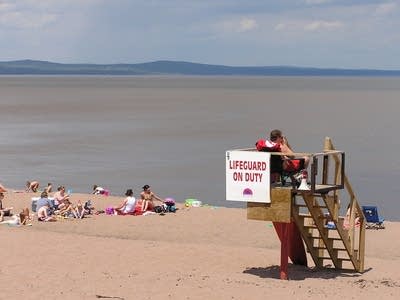Beachgoers beware: Not all beaches are tested for bacteria

Minnesotans are used to seeing the occasional beach closing each summer after animal waste washes into a lake after a heavy rain, or hot weather makes for ideal conditions for bacteria to grow.
But many beaches in Minnesota aren't being tested this summer, including 40 along Lake Superior that in past years the Minnesota Pollution Control Agency has tested for E. coli levels.
E. coli bacteria can reach higher levels in the summer when warm weather combines with pet feces, geese and other bird droppings and even human waste that gets into the lake. If conditions are bad enough, swimmers who ingest the water can get sick.
As a precaution, many park districts, cities and other government agencies test the water at beaches regularly in the summer.
Create a More Connected Minnesota
MPR News is your trusted resource for the news you need. With your support, MPR News brings accessible, courageous journalism and authentic conversation to everyone - free of paywalls and barriers. Your gift makes a difference.
Testing in the Twin Cities led to two beach closings this week -- one at Lake Hiawatha in Minneapolis and another at Wayzata Beach in Wayzata.
Testing was also done on Lake Superior, until tightened budgets led the MPCA to rethink its priorities. Officials decided the beach testing should be done by an outside contractor, because the issue was more of a public health concern than an environmental one, MPCA spokeswoman Jodi Boyne said.
But the contractors haven't started the work yet, meaning the Lake Superior beaches aren't being tested. And at least one environmental group has raised concerns about the lack of testing.
"This year we may or may not have conditions that would ordinarily result in those beach advisories, but we don't know because the data isn't being collected and analyzed, said Dave Dempsey, a spokesman for Conservation Minnesota. "I think most Minnesotans, when they go to a public beach, assume that it is being monitored."
Boyne said there have been delays in transferring the beach monitoring program to contractors.
"Unfortunately, this transition in getting the contract through has taken longer than we would have liked and it definitely could have gone smoother," Boyne said. "But beach monitoring is going to return to Lake Superior."
The program will definitely be in place by next summer, and it's possible some testing could happen before the end of this summer, she said.
It's unclear whether Lake Superior swimmers have truly been put at risk by the gap in water testing, but the Minnesota Department of Health said no illness outbreaks linked to beaches have occurred this year.
In the last 10 years, 13 outbreaks have occurred at beaches. But Trisha Robinson, an epidemiologist at the Minnesota Department of Health, said it's more likely that swimmers will become sick from other swimmers than from E. coli.
The last waterborne illness outbreak, which was norovirus, happened in 2008. And most of the beach testing is for E. coli, not norovirus, because E. coli levels can be an indicator of potentially dangerous disease-causing bacteria.
Robinson said the best thing for swimmers to do is take regular precautions, such as not getting water in their mouths.
"Every swimmer should probably just be under the assumption that a beach may not be monitored," Robinson said.
Many beaches in the Twin Cities are monitored weekly. The number of beach closings have been relatively stable in recent years, said Bill Belknap, a spokesman for Hennepin County Environmental Health.
"It's a summer predictable event," he said.
In Minneapolis, parks officials over the years have tried to make it less likely for E. coli levels to rise at its 12 beaches. All of the land surrounding the Minneapolis bodies of water is now park land, which means there's a buffer between people's yards and the lakes, said Dawn Sommers, public information manager for the Minneapolis Park and Recreation Board.
"We can do plantings, we have aggressive monitoring, we're very careful with how we deal with trails," Sommers said.
Lake Hiawatha remains vulnerable, however, because Minnehaha Creek flows through it, she said.
"Whenever there's a large amount of rain or a consistent rainfall over a short period of time, it's prone to being closed because the bacteria count goes up," Sommers said.
Lake Hiawatha beach is likely to be closed until at least Wednesday. And Belknap said Wayzata Beach is being tested daily until bacteria counts reach safe levels again.
